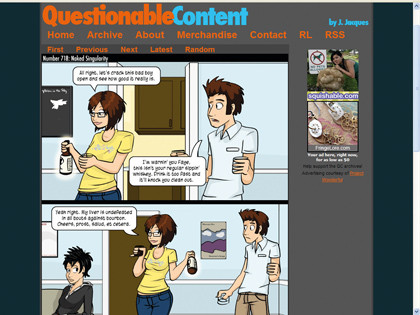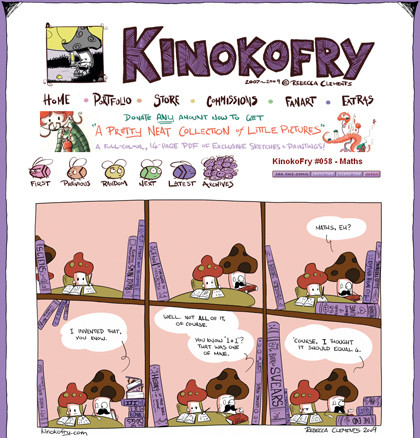Online benefits
So what advantages does the web hold for anyone wanting to break into cartooning? "Oh, tons," says North. "A huge potential audience, great interaction with your readers, the ability to see what people like and what they don't, the ability to see how people respond to what you're doing in real-time – there's just tons of great stuff that you get by being online.
"For me personally I get to be a cartoonist, because my comic would never survive in print. Maybe one in 100 people would like it, but online, I can gather that one per cent all in one place."
"Another benefit is the immediacy of the feedback I receive when I post online," adds the guy who draws Abstruse Goose. "I often receive feedback and constructive criticism within minutes of posting a comic and I always appreciate it. I also appreciate the enormous freedom that being online affords in terms of the content, style and format of the comics."
This idea of freedom is one that's shared and highly valued by all of the artists that we spoke to. Questionable Content's Jacques cites it as his number one reason for choosing to publish his comics online. But what else does he value about doing things online?

ONLINE FREEDOM: Questionable Content writer Jeph Jacques supports his family from the income of his comic site
"Potentially unlimited audiences, no middlemen between the creator and the audience, higher profit margins... lasers," he jokes. Another important benefit of distributing comics only over the internet is the speed with which one can become popular.
Get daily insight, inspiration and deals in your inbox
Sign up for breaking news, reviews, opinion, top tech deals, and more.
"For one thing, it means that absolutely anyone can get instant exposure," says Kinokofry's Clements. "It doesn't mean that you will, or that the response will be good, but it's a free-for-all, and it means that people aren't spending years sending pages out to publishers before they get seen. I think there's a fairly good sense of community in general," she adds, "and it's one of the main reasons I love it."
Getting noticed
Given the freedom to publish whatever they feel others will like to read, online cartoonists face an increasingly crowded marketplace. So how difficult is it to stand out from the crowd and gain an audience?
"If you play your cards right, if you manage to attract the right audience for your work, or if you get lucky, then you can very quickly have a large audience that you can deliver work to as often as you like," says Clements.
"Getting constant feedback can be a great thing. It's certainly addictive and can be a driving force to either improve or produce more."
For that guy who draws Abstruse Goose, attention came early. "I've been fortunate in that my comic always seems to get more attention than it deserves," he claims.
"I got lucky in that one of my comics made it to the front page of Digg after I had been posting comics regularly for only about three weeks. Social media sites like Digg, Reddit and StumbleUpon can expose your site to many potential readers."
Online cartoonists also tend to check out each others' work, and they're uniquely placed to recommend other comics to their readers – something that print cartoonists can't do, as North explains: "The great thing about online comics is that this happens naturally, even if you don't advertise. In a comics page in a newspaper, Garfield's creator Jim Davis can't say 'Hey, check out Mary Worth!' because there's finite room on the comics page. If a paper picks up Mary Worth, that might mean that Garfield gets dropped.
"But online, I can say 'Hey, check out this awesome comic!' – and I do, all the time – because there's no loss to me. If a reader likes it too, they'll just read two comics instead of one."
So, which up and coming online comics do our artists recommend and read themselves? "Raymondo Person and Achewood are easily my personal favourites," says Clements. "Read them, read them, read them! They really are brilliant. You will read them and never want to stop – except to talk about them with other people forever."

MAGIC MUSHROOMS: Rebecca Clements' Kinokofry is filled with wisecracking mushrooms and their pet bugs
"There are too many to name," says Cyanide and Happiness' Matt Melvin. "I would start with Saturday Morning Breakfast Cereal and maybe XKCD if you've got an inner nerd." "I like Toothpaste For Dinner," adds his colleague Rob.
Ideas before artwork
So, with so many comics being produced exclusively online, what makes an outstanding comic – one that will be noticed and loved by many and possibly make its creator famous, if not rich?
"For comedy comics it's the joke, and for dramatic comics it's the story," says North. "It sounds simple, but I think it's the truth! I believe that a good comic script can succeed despite being drawn badly, but that a bad script can't be saved by good art. Of course, great writing and great illustration makes for a great comic 100 per cent of the time."
Jacques agrees with this principle. "Good artwork is a huge plus, but it's the writing that will keep me coming back for more," he explains. So with both artists agreeing that ideas are in general more important than artwork, where does their inspiration come from?
Writing what you know may be the key here. "My ideas tend to come from whatever is currently happening in the world," says Gemmell. "For me, being a self-employed iPhone and Mac software developer, a big part of that is tech news and events," he says. "Many of the scenarios also come from online chats with friends and colleagues, suitably sanitised (in both senses of the word)."
So if you fancy yourself as a cartoonist, get cracking. You never know where it might lead.